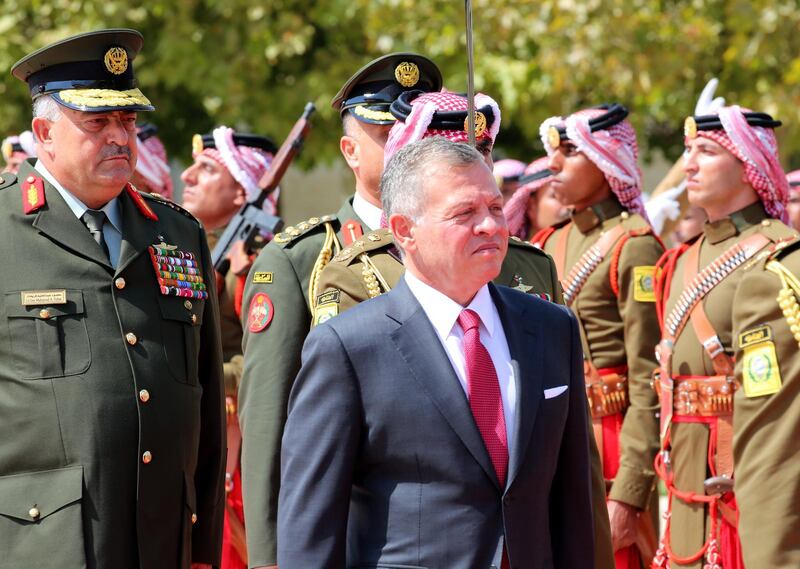Jordan will cancel a land-annexing article in its peace treaty with Israel, King Abdullah announced on Sunday in a move celebrated by many across the country who long believed Tel Aviv had taken ties with its neighbour for granted.
In a meeting with Jordanian political figures at the royal palace, King Abdullah announced his decision to terminate an agreement in the kingdom’s 1994 peace treaty that allowed the Israeli government and farmers to annex Jordanian lands of Baqoura and Ghamr near the border.
“Baqoura and Ghamr are Jordanian lands and will remain Jordanian and we will exercise full sovereignty over our territory,” the King said as he announced the decision, a Royal Court statement reported.
“In such difficult regional circumstances, our priorities are to protect our interests and do everything that is necessary for Jordan and Jordanians,” the monarch added.
The two areas in the fertile Jordan Valley, the breadbasket for Jordan, Israel and the Palestinian territories, are recognised Jordanian territory with temporary Israeli land ownership rights.
Under the 1994 Wadi Araba treaty, Jordan recognised Israel’s ownership of the lands for a 25-year-period, an arrangement that would automatically renew for another 25 years unless one side announced its decision to end the agreement one year before the renewal kicks in.
What makes Baqoura, known to Israelis as Naharayim, Hebrew for “two rivers,” particularly valuable is that it marks where the Yarmouk River meets the Jordan River, providing vital water supplies. Al Ghamr lies in the southern Jordan Valley. Both have been developed by Israeli farmers for decades.
Jewish settlers had lived in the area of Baqoura since the 1920s. The armistice after the 1948 war stated that the land was in Jordanian territory, and not what is now modern-day Israel. The area was disputed until Israel recognised it as Jordanian land. The ownership rights of the Jewish settlers were recognised as well.
______________
Read more:
Jordan’s King Abdullah II warns of ‘dangers’ to Jerusalem
Jerusalem to remove UN agency for Palestinians from city
At Jordan border, Damascus seeks to revive regional trade
______________
On Sunday afternoon, the government held an emergency session to discuss how to fulfill the King’s directives and end the lease agreement and strike it from the Wadi Araba peace deal. The Jordanian Foreign Ministry promptly informed the Israeli government of its intentions.
The decision came amid growing public pressure for Jordan to reclaim the lands. After a months-long campaign via social media, largescale protests attended by thousands shut down streets in Amman on Thursday, Friday and Saturday.
In response to the King’s decision, hundreds of Jordanians took to social media to thank the monarch, posting Tweets and posts reading “thank you Your Majesty”, “congratulations”, “welcome back Baqoura” and “the people’s rights have been restored.”
The King even took to Twitter himself to post a rare tweet explaining the decision.
“Baqoura and Ghamr have always been at the top of our priorities and our decision is to terminate the annexation of Baqoura and Ghamr from the peace treaty is based on our commitment to take all necessary decisions for Jordan and Jordanians,” the King said in an Arabic tweet.
The move marked a rare retribution from Jordan over Israeli policies.
Despite the two sides sharing close security ties, there has been increased tensions between Jordan and Israel over the Israeli governments provocative measures ranging from placing restrictions on Jerusalem’s Al Aqsa Mosque and the Noble Sanctuary - recognised in the peace treaty as under Jordanian custodianship - to the continued construction of settlements on 1967 territory.
Relations between Jordan and Israel deteriorated last year when an Israeli security officer shot and killed two unarmed Jordanian men in the Israeli embassy in Amman. Relations sunk further in December with the relocation of the American embassy to Jerusalem against Jordan’s warnings and the subsequent violent reaction to protesters in Gaza that have left hundreds of Palestinians dead and tens of thousands wounded.
Several Jordanian officials, analysts and MPs have privately said Israel has taken Jordan for granted one too many times.
The decision was met with exuberance from Jordanians, for whom the peace treaty has become deeply unpopular over Israel’s reluctance to follow through on water-sharing agreements, restrictions on Jordanian trade with the West Bank, and most of all what many see as a violent occupation of Palestinian territory and the denial of basic rights and self-determination to Palestinians.
“His Majesty the King has secured the will of Jordanians to restore Baqora and Al Ghamer and closed the door to any attempts to undermine the independence of our decision-making,” Parliament speaker Atef Tarawneh said in a tweet.





